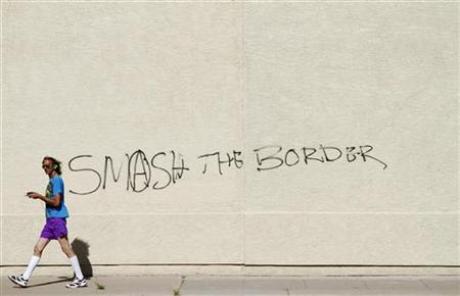 Adalberto Lopez’ family-run musical instrument shop in the bustling Arizona border city of Nogales sells guitars and accordions to foot-stomping banda musicians and mariachis who cross up from Mexico to shop.But in mid-May, the music stopped in the store. Mexican customers who account for almost all its sales stayed away as part of a two-day boycott to repudiate Arizona’s tough new immigration law.”The street and my shop were empty,” said Lopez, of the “Day Without a Mexican” protest on May 14 and 15.The law may make life more difficult for border retailers already hobbled by the recession and long border crossing waits, and Arizona’s economy could take a hit from lost business.
Adalberto Lopez’ family-run musical instrument shop in the bustling Arizona border city of Nogales sells guitars and accordions to foot-stomping banda musicians and mariachis who cross up from Mexico to shop.But in mid-May, the music stopped in the store. Mexican customers who account for almost all its sales stayed away as part of a two-day boycott to repudiate Arizona’s tough new immigration law.”The street and my shop were empty,” said Lopez, of the “Day Without a Mexican” protest on May 14 and 15.The law may make life more difficult for border retailers already hobbled by the recession and long border crossing waits, and Arizona’s economy could take a hit from lost business.
But on a larger scale, experts believe the overall trade between the United States and Mexico, valued at around $1 billion a day, is unlikely to suffer from this latest wrinkle in the often strained U.S.-Mexico relations.Passed last month, the law requires state and local police to check the immigration status of those they reasonably suspect are in the country illegally. Opponents on both sides of the border say it is a mandate for racial profiling.
Mexico President Felipe Calderon sharply criticized it during a visit to Washington last week. Standing beside U.S. President Barack Obama, Calderon said Mexican immigrants make a “significant contribution to the economy and society of the United States” but many face discrimination “as in Arizona.”
The measure has triggered legal challenges, convention cancellations, and, most recently, snubs by some of the 65,000 Mexicans who cross into the desert state each day to work, visit family and shop, spending $7.4 million, according to a recent University of Arizona study.”The people in Mexico have been fairly insulted by this legislation, as have most Latinos in the state of Arizona,” said Bruce Bracker, president of the Downtown Merchants Association in Nogales, who said local shops’ sales fell 40 percent to 60 percent as Mexicans stayed home during the boycott.
NO TRADE SLOWDOWN
Obama has spoken out against the law, which is backed by a majority of Americans.The United States, Mexico and Canada created the world’s largest free trade block with the North American Free Trade Agreement in 1994, although the U.S.-Mexico trade relationship has been jarred by job losses and charges of protectionism.Trade between the two neighbors is already ruffled by a trucking row. Mexico is waiting for the United States to let its trucks circulate again on U.S. roads, ending a spat that led it to slap duties on $2.4 billion in U.S. goods.
But analysts and customs brokers say the furor over the state law is unlikely to disrupt the $21 billion annual flow in goods over the Arizona-Mexico border, between clients scattered across northwest Mexico and the United States.”Once you work so hard to get a business enterprise up and operating, how much are you willing to reverse that based upon something that someone relatively remote from you does?” said Rick Van Schoik, director of the North American Center for Transborder Studies at Arizona State University in Phoenix.
“Life goes on regardless of the newsy political conversation that’s going on,” he added.Customs brokers in Nogales, meanwhile, who clear goods ranging from semi-conductor chips to fresh produce headed over the border by truck and freight train, said their clients were more concerned about the sputtering economic recovery than the migrant law, which is due to come into effect on July 29.
“The economy is one thing, but that’s an ongoing situation for everyone,” said Nogales customs broker Terry Shannon Jr.”But I have not had any dialogue with my clients at this point where they have called me up and point-blank (asked) ‘What do you think of the law? Where are we going with this?'”
‘ONE MORE OBSTACLE’
But in cross-border retail, where sentiment plays a role in shaping Mexican shoppers’ spending, the outlook is more vexed, business groups say.Informal Mexican boycotts in protest at the measure have taken hold in other cities bordering Arizona, among them San Luis Rio Colorado, south of Yuma, where some traders are opting to head to California and Nevada to buy appliances and cars.”They’re looking for other options,” said Juan Manuel Villarreal, president of the city’s chamber of commerce, adding that it is still too early to quantify the impact.Authorities in Nogales the state’s principal trade gateway to Mexico were unable to place a dollar value on the recent boycott by Mexican shoppers, whose spending accounts for nearly a quarter of all jobs in surrounding Santa Cruz County, and almost half of taxable sales.
But Olivia Ainza-Kramer, president of the Nogales-Santa Cruz County Chamber of Commerce said a backlash from the law piled pressure on local shops, restaurants and hotels already hurt by the recession and delays of up to two hours for customers crossing up from Mexico.”This is one more obstacle that’s getting in the way,” she said.(Reuters)
